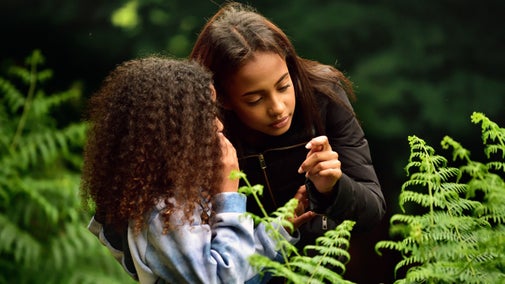
Donate
Everyone needs nature, now more than ever. Donate today and you could help people and nature to thrive at the places we care for.

Find out more about our important work at Allen Banks and Staward Gorge, including the cutting down of invasive rhododendron and turning it into charcoal, and restoring natural woodland habitat by felling hectares of non-native conifers and replacing them with native broadleaf species.
Rhododendron was introduced into Allen Banks during Victorian times as an ornamental plant. Since then, it has steadily increased its size and range to cover a significant proportion of the site, making it difficult for other native plants to grow.
To make space for other plants and increase the diversity of the woodland, our rangers and volunteers cut down this invasive rhododendron and stack it in the wood to dry out. When dry, it is then cut and stacked in the charcoal kiln.
Once the kiln is lit, air vents at the base are opened and the chimneys are moved around to control the rate of burn. After 11 hours, the chimneys are removed, and the air vents blocked. The charcoal inside then continues to cook without any oxygen.
After being left for a couple of days to cool completely, the kiln is opened, and the charcoal is collected.
In the summer of 2019, we carried out the first steps in our project to restore the natural woodland habitat of Staward Gorge. The project is part of our woodland management plan to restore the site to predominantly native broadleaf species, to stimulate biodiversity.

To carry this out, a phased removal of non-native conifers was implemented. Around 15 hectares of conifers were felled and will ultimately by replaced by native broadleaf and Scots pine trees.
Much of Staward Gorge woodland is a ‘Plantation on an Ancient Woodland site’ (PAWs). During the Second World War the original native broadleaf trees were felled as part of the war effort.
After the war, the newly barren woodland was replanted with fast-growing conifer trees that could be used should another war break out. Fortunately, this didn’t happen, but in Staward Gorge it meant the timber was never felled and subsequently now dominates the landscape.
These conifers cause problems for the wildlife as their thick foliage blocks any natural sunlight from reaching the ground, meaning the woodland flora is not regenerating. This reduced the species that can live there, including dormice and birds such as wood warblers and pied flycatchers.

It was only through the generous donations and support from members and volunteers that we were able to carry out these vital repairs and restoration works, and can continue to do so to this day.
So thank you to all of our donors and helpers – we really couldn't do it without you.
Find out about our volunteering opportunities here.

Everyone needs nature, now more than ever. Donate today and you could help people and nature to thrive at the places we care for.

Get out into nature and explore the rich ‘wilderness garden’ at Allen Banks – a woodland paradise with walking trails and abundant wildlife including red squirrels and roe deer.

With woodland to explore, sticks, and plenty of ground to cover, Allen Banks is a slice of canine heaven. Bring your dog here for an outdoor treat. Allen Banks and Staward Gorge is a one pawprint rated place.

Northumberland’s largest semi-natural woodland has been shaped by its many owners over the centuries, most notably by its dedicated 19th-century custodian, Susan Davidson.

Read about our strategy, which focuses on restoring nature, ending unequal access and inspiring more people.

We believe that nature, beauty and history are for everyone. That’s why we’re supporting wildlife, protecting historic sites and more. Find out about our work.